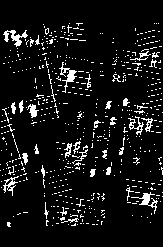 WE've MOVED
WE've MOVED
see new address and contact email in ABOUT US
"The Opposite of War"
Steve McLean Ensemble
Steve McLean: guitar
Tim Inman: keyboards
Jim McGirr: bass
Dave Fields: drums
The liner notes to this disc are quite up front about the fact that none of the music is improvised. This should give readers (and thus, this reviewer) of the Improvisor pause as to the point of having a review of such a disc. Therefore, I will be up front about the reasons reviewing this disk seemed relevant: (1) some of the apparent influences of the music of the group are probably influences of many Improvisor readers; (2) the compositional style is somewhat forward-looking and non-mainstream, if poorly-executed and derivative.
Perhaps the best way to give the flavor of this disc, is to point out that the tune "Windows Part I" sounds (in parts) like King Crimson’s "Larks Tongues in Aspic" as covered by the Yellow Jackets. The band is very much a combination of the veneer and attack of the most egregious Fuzak groups, with the quirky excesses of Progressive Rock bands of the 70’s and 80’s (and perhaps some even now ensconced in garage/basement oblivion.) There are the strong accents on the on-beats and unison phrasing of the main themes, so common to cultural accidents like Spyo Gyra and Lee Ritenour. Often in combination with the latter, and usually played by McLean, there are practically plagiarized Frippisms--hypnotically-repeated, minor-key, bouncy circular patterns, in odd times like 5/4 and and 7/4.
As to the compositions themselves, they are characterized by their choppiness--like the worst excesses of Prog Rock. The "tunes" are largely vignettes that are strung together with a sense of cohesiveness that is at best unclear. The chord progressions are very primitive. It sounds like the impetus behind them is to transfer the same finger positions to different parts of the guitar, rather than any kind of voice leading or concern for the overall piece. Further adding to the jumble is the fact that each tune is flanked by a few seconds of electronic sound effects--pleasant for those interested in equipment demos, but merely filler to the close listener.
The liner notes even seem to suggest that the tunes might have literally been collages of recordings, pieced together using state-of-the-art music software. Post-modernistic collages in music tend to appeal to those whose sensibilities are less mainstream, so the choice to give these songs the smooth, emotionless veneer of commercial jazz is highly questionable choice.
Other tunes, like "Flow" and parts of "Space," back off of the Fuzak to borrow from early Genesis albums like "Selling England by Pound." Here we find a softer, more contemplative approach, dominated by tasteful, open piano-patch voicings by Tim Inman. If not for the Frippian elements, one would half expect to hear Peter Gabriel enter after each break. These pieces are less annoying, and more cohesive, yet the style has been done, and better.
Things lay back even more for the dreamy Fuzak love song "Fourth Dimension"--at least for parts of it. This could be the background for the ocean view romance scene in any straight-to-video Wings Hauser epic. However, even in this setting McLean inexplicably splices in a few bars of the punchy minor-key stuff and ups the pace. This song is another example of how unpredictable the CD is, but how meager the payoff.
-Wyman Brantley
Contact: smac1@maine.rr.com
Recommended Records, (SM1)